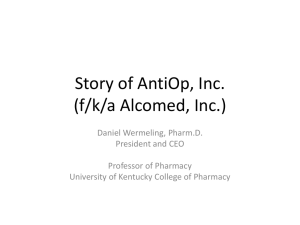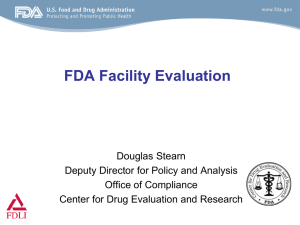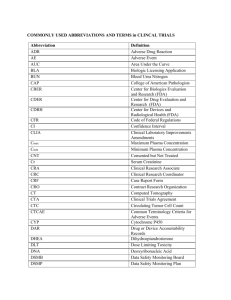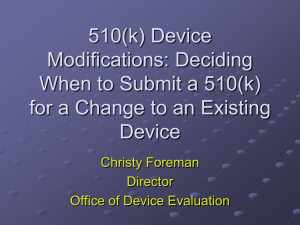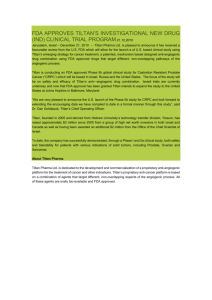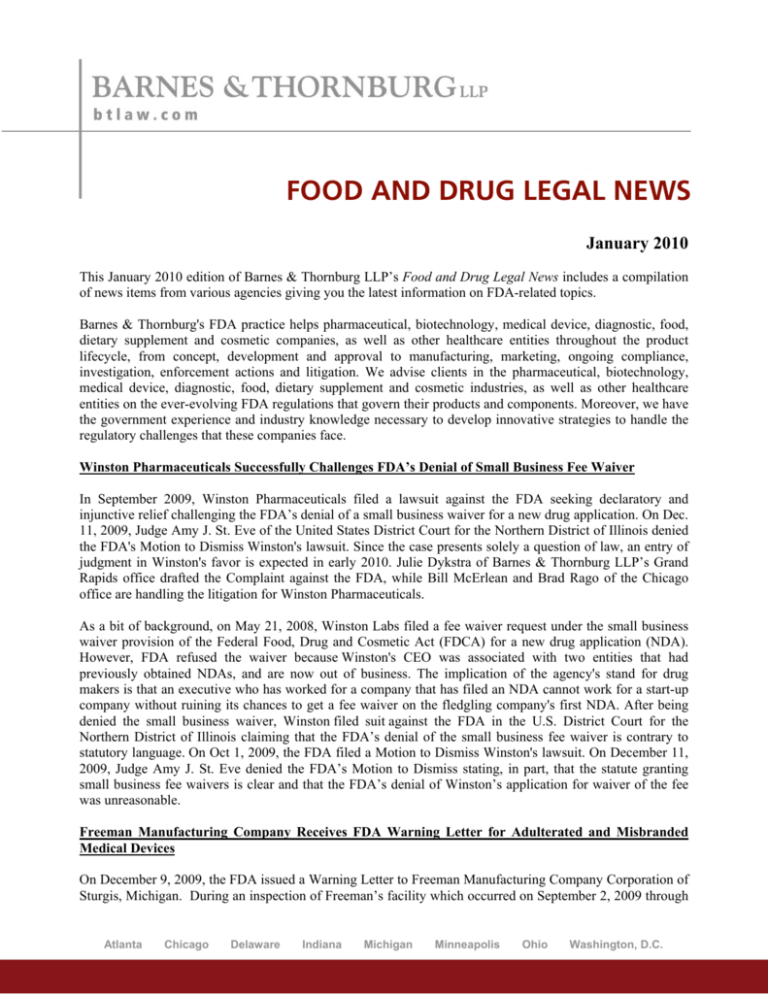
FOOD AND DRUG LEGAL NEWS
January 2010
This January 2010 edition of Barnes & Thornburg LLP’s Food and Drug Legal News includes a compilation
of news items from various agencies giving you the latest information on FDA-related topics.
Barnes & Thornburg's FDA practice helps pharmaceutical, biotechnology, medical device, diagnostic, food,
dietary supplement and cosmetic companies, as well as other healthcare entities throughout the product
lifecycle, from concept, development and approval to manufacturing, marketing, ongoing compliance,
investigation, enforcement actions and litigation. We advise clients in the pharmaceutical, biotechnology,
medical device, diagnostic, food, dietary supplement and cosmetic industries, as well as other healthcare
entities on the ever-evolving FDA regulations that govern their products and components. Moreover, we have
the government experience and industry knowledge necessary to develop innovative strategies to handle the
regulatory challenges that these companies face.
Winston Pharmaceuticals Successfully Challenges FDA’s Denial of Small Business Fee Waiver
In September 2009, Winston Pharmaceuticals filed a lawsuit against the FDA seeking declaratory and
injunctive relief challenging the FDA’s denial of a small business waiver for a new drug application. On Dec.
11, 2009, Judge Amy J. St. Eve of the United States District Court for the Northern District of Illinois denied
the FDA's Motion to Dismiss Winston's lawsuit. Since the case presents solely a question of law, an entry of
judgment in Winston's favor is expected in early 2010. Julie Dykstra of Barnes & Thornburg LLP’s Grand
Rapids office drafted the Complaint against the FDA, while Bill McErlean and Brad Rago of the Chicago
office are handling the litigation for Winston Pharmaceuticals.
As a bit of background, on May 21, 2008, Winston Labs filed a fee waiver request under the small business
waiver provision of the Federal Food, Drug and Cosmetic Act (FDCA) for a new drug application (NDA).
However, FDA refused the waiver because Winston's CEO was associated with two entities that had
previously obtained NDAs, and are now out of business. The implication of the agency's stand for drug
makers is that an executive who has worked for a company that has filed an NDA cannot work for a start-up
company without ruining its chances to get a fee waiver on the fledgling company's first NDA. After being
denied the small business waiver, Winston filed suit against the FDA in the U.S. District Court for the
Northern District of Illinois claiming that the FDA’s denial of the small business fee waiver is contrary to
statutory language. On Oct 1, 2009, the FDA filed a Motion to Dismiss Winston's lawsuit. On December 11,
2009, Judge Amy J. St. Eve denied the FDA’s Motion to Dismiss stating, in part, that the statute granting
small business fee waivers is clear and that the FDA’s denial of Winston’s application for waiver of the fee
was unreasonable.
Freeman Manufacturing Company Receives FDA Warning Letter for Adulterated and Misbranded
Medical Devices
On December 9, 2009, the FDA issued a Warning Letter to Freeman Manufacturing Company Corporation of
Sturgis, Michigan. During an inspection of Freeman’s facility which occurred on September 2, 2009 through
Atlanta
Chicago
Delaware
Indiana
Michigan
Minneapolis
Ohio
Washington, D.C.
September 4, 2009, an FDA investigator determined that Freeman manufactures VENA-FLO® USA
2030/3040 Medical Compression Stockings, VENA-FLO® ANTI-EMBOLISM STOCKINGS and VENAFLO® Fashion 20 Medical Support Stockings, Under section 201(h) of the Federal Food, Drug, and Cosmetic
Act (the Act), 21 U.S.C. 321(h), these products are medical devices because they are intended for use in the
diagnosis of disease or other conditions or in the cure, mitigation, treatment, or prevention of disease, or are
intended to affect the structure or function of the body.
The FDA inspector concluded that the aforementioned medical devices are adulterated under section
501(f)(1)(B) of the Act, 21 U.S.C. 351(f)(1)(B), because Freeman did not have an approved application for
premarket approval (PMA) in effect pursuant to section 515(a) of the Act, 21 U.S.C. 360e(a), or an approved
application for an investigational device exemption (IDE) under section 520(g) of the Act, 21 U.S.C. 360j(g).
The FDA inspector also concluded that the devices are misbranded under section 502(0) the Act, 21 U.S.C.
352(0), because Freeman did not notify the agency of its intent to introduce the devices into commercial
distribution, as required by section 510(k) of the Act, 21 U.S.C. 360(k).
Freeman was given 15 days to respond to the FDA Warning Letter.
http://www.fda.gov/ICECI/EnforcementActions/WarningLetters/ucm193794.htm
Center for Science in the Public Interest Urges FDA to Revamp Food Label Regulations and Increase
Policing Efforts
The Center for Science in the Public Interest (CSPI) is a public interest group located in Washington, D.C.
On December 9, 2009, the CSPI announced that it is calling on the FDA to crack down on allegedly deceptive
claims on food products and to solidify definitions for the use of the terms "fiber" and "all natural." In
addition, CSPI would like the FDA to promulgate regulations that place greater restrictions on when a food
manufacturer can state or imply that a food product is “healthy.” Finally, CSPI requests FDA to increase
their policing efforts concerning claims concerning the use of whole grains, caloric content, total fat, saturated
fat, trans fat, sodium, cholesterol and sugar in food products.
http://www.cspinet.org/
Spectranetics Corporation to Pay $5 Million to Resolve Allegations Relating to Medical Devices
The U.S. Department of Justice announced on December 29, 2009 that Spectranetics Corporation, a medical
device manufacturer, located in Colorado Springs, Colorado, has agreed to pay the United States $4.9 million
in civil damages plus a $100,000 forfeiture to resolve claims against the company. The claims arise from
allegations that the company illegally imported unapproved medical devices and provided them to physicians
for use in patients, conducted a clinical study in a manner that failed to comply with federal regulations and
promoted certain products for procedures for which the company had not received Food and Drug
Administration (“FDA”) approval or clearance.
The company manufactures, distributes and sells certain medical lasers and peripheral devices for those
lasers, such as lead wires that guide the lasers through vascular tissue and catheters that carry and contain the
lasers inside the veins, including, specifically, the CVX-300 Medical Laser and the CliRpath Turbo Laser
Catheter, the TURBO Elite Laser Ablation Catheter, and the TURBO-Booster Laser Guide Catheter.
In resolving this matter, Spectranetics has entered into a civil settlement agreement and a non-prosecution
agreement with the United States. The company also entered into a corporate integrity agreement with the
Office of Inspector General of the Department of Health and Human Services.
Atlanta
Chicago
Delaware
Indiana
Michigan
Minneapolis
Ohio
Washington, D.C.
According to the non-prosecution agreement, officers and employees who acted on behalf of the company
engaged in multiple areas of wrongdoing. Specifically, Spectranetics allegedly illegally imported unapproved
medical devices from overseas manufacturers and distributed those devices for use in human patients, and
failed to meet its reporting obligations to FDA regarding a study named “CORAL” (COronary graft Results
after Atherectomy with Lasers) and another associated study in connection with the devices listed above.
Under the terms of the non-prosecution agreement, Spectranetics has accepted responsibility for its conduct,
has instituted remedial measures to prevent this conduct in the future, and will continue to cooperate in the
ongoing criminal investigation. As a result, Spectranetics will not be criminally prosecuted for this conduct.
Under the civil settlement agreement, the United States asserted that, as a result of the conduct described here
and set forth in more detail in the civil agreement, Spectranetics caused false claims to be submitted to the
Medicare Program during portions of the time period from 2003 to 2008.
“It is important to hold those who submit false claims to Medicare responsible for their actions,” said U.S.
Attorney David Gaouette. “Settlements such as this help to protect the integrity of the Medicare system.”
“The Department of Justice will be vigilant in pursuing cases against medical device companies that break the
law and defraud taxpayers,” said Tony West, Assistant Attorney General for the Justice Department’s Civil
Division.
“Our compliance agreement with Spectranetics holds the company and its executives accountable for
violations of Federal health care program and FDA requirements,” said Daniel R. Levinson, Inspector
General of the Department of Health and Human Services. “Records from Spectranetics’ clinical
investigations will be audited by an Independent Review Organization to ensure compliance with FDA rules
– including reporting of adverse events.”
http://www.justice.gov/usao/co/press_releases/2009/December09/12_29_09.html
PMT Corporation Receives FDA Warning Letter for Adulterated Medical Devices
On December 3, 2009, the FDA issued a Warning Letter to the PMT Corporation of Chanhassen, Minnesota.
During an inspection of PMT’s manufacturing facility which occurred on July 22 through August 4, 2009,
investigators from the FDA determined that PMT manufactures medical devices, such as breast expanders,
tissue expanders, neurosurgical electrodes, traction systems, cervical collars, and gel shapes for scar
treatment.
According to FDA inspectors, these medical devices are adulterated within the meaning of section 501(h) of
the Act [21 U.S.C. § 351(h)] in that the methods used in, or the facilities or controls used for, their
manufacture, packing, storage, or installation are not in conformity with the Current Good Manufacturing
Practice (CGMP) requirements of the Quality System (QS) regulation found at Title 21, Code of Federal
Regulations (21 CFR), Part 820.
In addition, FDA inspectors concluded that PMT Medical Device Reporting (MDR) procedures. In particular,
your firm failed to submit Medical Device Reports for two reportable events:
1.) Complaint number N06-020, which reported that a Depthalon electrode fell apart during removal. Two
contacts remained inside the patient and were removed later under x-ray.
2.) Complaint Number N09-009, which reported that a sheath slipped off an electrode and was
unintentionally left in the patient's scalp.
Atlanta
Chicago
Delaware
Indiana
Michigan
Minneapolis
Ohio
Washington, D.C.
FDA requested PMT to take prompt action to correct the violations addressed in the Warning Letter. Failure
to promptly correct these alleged violations can potentially result in regulatory action being initiated by the
FDA without further notice. These actions include, but are not limited to, seizure, injunction, and/or civil
money penalties. Also, federal agencies are advised of the issuance of all Warning Letters about devices so
that they may take this information into account when considering the award of contracts.
PMT was given 15 days to respond to the FDA Warning Letter.
http://www.fda.gov/ICECI/EnforcementActions/WarningLetters/ucm193077.htm
FDA Expands Presence Outside the U.S. with Opening of Mexico City Office
As part of its continuing effort to buttress food and medical product safety in this country by working with its
regulatory partners overseas, the FDA announced on December 15, 2009 the opening of its new Mexico City
post. This is the Agency’s third post in Latin America and its tenth international post in the past 13 months.
“The opening of this office represents an important step as we re-design our product safety strategy. We, like
our partners in the Mexican Government, realize that prevention is the key. For example, more than a third of
the fresh fruits and vegetables we eat come from Mexico as do a large amount of our medical devices. Having
FDA experts located permanently there will be mutually beneficial to both our countries and respective
citizens,” said U.S. FDA Commissioner Margaret A. Hamburg, M.D.
Staff assigned to the FDA’s Mexico City post will work with their counterparts in the Mexican government to
harmonize regulations and guidance standards and to work on other collaborative initiatives. These
collaborations will include, for example, information-sharing on the respective regulatory systems and joint
workshops on the safety of food and medical products. Agencies in both governments also will make efforts
to find opportunities for joint training on food-borne illnesses and the oversight of food traded internationally.
FDA staff also will offer collaboration on the use of the latest laboratory techniques, foster other collaborative
initiatives to ensure the safety of food and medical products marketed in the two countries, and be a “portal”
to the FDA for counterpart Mexican agencies and the US-export industry in Mexico.
“FDA staff will work with industry in Mexico as well,” said Murray M. Lumpkin, M.D., U.S. FDA Deputy
Commissioner for International Programs. “FDA experts in Mexico City will work closely with local
industries that ship food and medical products to the United States to improve their understanding of U.S.
safety and product quality expectations. Their activities will include providing technical advice and working
with government agencies and the private sector to develop certification programs.”
To date, the FDA has opened 10 international posts, including posts in China, India, Europe, and Latin
America, along with its USA-based staff. The other posts in the Latin America Office are located in Santiago,
Chile, and at the FDA’s Latin America Office headquarters in San José, Costa Rica.
http://www.fda.gov/NewsEvents/Newsroom/PressAnnouncements/ucm194165.htm
Food Defense Tool from FDA and APHIS Helps Farmers, Producers Assess Vulnerabilities
The FDA of the U.S. Department of Health and Human Services and the Animal and Plant Health Inspection
Service (APHIS) of the U.S. Department of Agriculture (USDA) have created an online tool to help farmers
and producers assess and mitigate vulnerabilities in their production processes.
Atlanta
Chicago
Delaware
Indiana
Michigan
Minneapolis
Ohio
Washington, D.C.
The risk assessment tool called Agriculture CARVER + Shock is designed to help the food industry at the
farm level – implement food production security methods. The software is free and available at
http://www.fda.gov/Food/FoodDefense/CARVER.
CARVER was originally developed by the U.S. military to identify areas that might be vulnerable to attack.
The FDA and USDA adapted the model to the food and agriculture sector. The software currently evaluates
potential vulnerabilities in the supply chains of different foods and food processes. The FDA and APHIS
worked with Sandia National Laboratories to develop the special agriculture module, designed primarily for
harvest and pre-harvest food production operations.
“This assessment tool helps the producer understand how an attacker might think,” said Stephen F. Sundlof,
D.V.M., Ph.D., director of the FDA’s Center for Food Safety and Applied Nutrition. “Producers can easily
identify weak spots in their operation and receive practical advice on countermeasures they can put in place.”
Cindy Smith, APHIS administrator, agrees. “Being prepared is a tremendous asset. Farmers can now see
firsthand what they can do to protect themselves and U.S. agriculture.”
Farms of all sizes can benefit. Producers are asked a series of questions about each component of their
production process. Based on the responses, Ag Carver provides scores for those components and specific
risk mitigation measures are recommended. These might include upgrades or enhancements to physical
security, process operations, or a change in personnel practices. Information entered by the program user is
not recorded by either FDA or APHIS.
The risk assessment tool derives its name from seven designated attributes for evaluation:
•
•
•
•
•
•
•
Criticality: What impact would an intentional attack have on public health or to the economy?
Accessibility: How easily can a terrorist get to this target?
Recuperability: How well could a system recover from an attack?
Vulnerability: How easily could an attack be accomplished?
Effect: What would be the direct loss from an attack, as measured by loss in production?
Recognizability: How easily could a terrorist identify a target?
Shock: What would be the psychological impact of an attack?
http://www.fda.gov/NewsEvents/Newsroom/PressAnnouncements/ucm193091.htm
Unilever Recalls Slim-Fast® Ready-to-Drink Shakes Due to Possible Contamination
On December 3, 2009, Unilever United States, Inc., in cooperation with the FDA, announced a massive,
nationwide voluntary recall of all Slim-Fast® ready-to-drink (RTD) products in cans, due to the possibility of
contamination with Bacillus cereus, a micro-organism, which may cause diarrhea and possibly nausea and/or
vomiting. The probability of serious adverse health consequences is remote. The products were sold in stores
nationwide.
The products are packaged in paperboard cartons and contain four, six or twelve steel cans that are 11 FL OZ
(325 mL) each. Individual cans are also sold in certain retail outlets. The recall involves all Slim-Fast® RTD
products in cans, regardless of flavor, Best-By date, lot code or UPC number. No Slim-Fast® powdered
shakes, meal bars, or snack bars are affected by this recall.
The recall was initiated after the company conducted quality testing on Slim-Fast® RTD products in cans.
Out of an abundance of caution, the company is recalling all RTD products in cans that are currently in
distribution centers, on-shelf or in back rooms in retail outlets or in consumers’ homes. The company is in the
Atlanta
Chicago
Delaware
Indiana
Michigan
Minneapolis
Ohio
Washington, D.C.
process of identifying and correcting the production issue, and will resume production and shipment of the
product when the issue has been addressed and corrected.
Consumers who have purchased Slim-Fast® RTD products in cans are urged to discard them immediately
and contact the company at 1-800-896-9479 for a full refund. The Consumer Services Center is open Monday
– Friday, 8:30 AM – 6:00 PM ET.
http://www.fda.gov/Safety/Recalls/ucm192978.htm
For additional information on the above matters, please contact Julie Dykstra, an of counsel member of the
firm’s Business Department and FDA group at (616) 742-3976 or jdykstra@btlaw.com.
ABOUT THE AUTHOR
Julie A. Dykstra concentrates her practice on FDA-regulated products, including pharmaceuticals,
biotechnology, medical device, nanotechnology, agribusiness, dietary supplements, food, and
cosmetics, with a primary emphasis on securing regulatory approvals, maintaining compliance and
preserving intellectual property rights in the United States and in key global markets.
Prior to joining Barnes & Thornburg, Ms. Dykstra worked as corporate counsel for Alticor, Inc.
Her daily practice includes work in domestic and international food, drug, cosmetic and consumer
product regulation, as well as regulatory and public policy issues relating to nutrition, dietary
supplements, food additives, pharmaceuticals, agribusiness, biotechnology and nanotechnology. In
addition, she counsels companies and individuals on the creation of effective and compliant web, print and broadcast
advertisements for FDA-regulated products and products directed to children. She also reviews advertisements for
Federal Trade Commission compliance.
In 1994, Ms. Dykstra earned her B.A. cum laude in political science with a minor in communications from Hope
College. She received her J.D. with honors in 1997 from Valparaiso University School of Law, where she served as the
chief justice of the Moot Court Society and was a student researcher for a well-known treatise on American civil
procedure. She is admitted to practice law in the states of Michigan and Indiana.
Ms. Dykstra is a past president of the Women Lawyers Association of Michigan's (WLAM) Western Michigan Region
and currently serves as a director at large for the state WLAM organization. In addition, she is an avid advocate and
volunteer for Gilda’s Club of Grand Rapids and the Ronald McDonald House of Western Michigan, which helps
families address and solve issues regarding their children’s healthcare.
Stay Connected to Barnes & Thornburg LLP through Twitter. To receive notification of additional
news, legal Alerts and information distributed by the firm, follow us at www.twitter.com/BTLaw_News.
© 2010 Barnes & Thornburg LLP. All Rights Reserved. This page, and all information on it, is proprietary and the
property of Barnes & Thornburg LLP. It may not be reproduced, in any form, without the express written consent of
Barnes & Thornburg.
This Barnes & Thornburg LLP publication should not be construed as legal advice or legal opinion on any
specific facts or circumstances. The contents are intended for general informational purposes only, and you are urged to
consult your own lawyer on any specific legal questions you may have concerning your situation.
Please send address changes or requests to opt out of this publication to megan.decker@btlaw.com.
Atlanta
Chicago
Delaware
Indiana
Michigan
Minneapolis
Ohio
Washington, D.C.




